Published in the May 3, 2019 edition.
By MARK SARDELLA
WAKEFIELD — With just 98 registered voters in attendance, Annual Town Meeting wrapped up the remaining 17 warrant articles in just over two hours last night, completing all 27 articles on the warrant in two sessions.
Before the meeting got down to business, Town Councilor Ann Santos delivered an appreciation of DPW Director Richard Stinson and Police Chief Rick Smith. Both men have long served the town and will be retiring over the next two months.
The night’s business got underway with a motion from Town Counsel Thomas Mullen to take up Articles 22 and 26 out of order at the start of the meeting. Since both articles included legal provisions, Mullen said that he wished to be on hand for the discussion. Should Town Meeting continue for a third night, Mullen explained, he would not be available.
Mullen’s motion carried.
Mullen then presented Article 22. The article concerned the process of enforcing town bylaws requiring property owners to remove snow and ice from sidewalks. It would also authorize the Town Council to appoint the hearing officer. Mullen explained that by adopting certain provisions of relevant state law and appointing a local hearing officer, it avoided the more cumbersome process of appeals going before a clerk magistrate at Malden District Court.
Town Meeting passed Article 22 with no discussion.
Bylaw Review Committee Chairman Daniel Lieber presented Article 26, which sought to require owners of street-facing, ground-level storefronts that are vacant for more than 90 days to register with the Building Department. The landlord would then have four choices: fill the vacancy; agree to display “public art” approved by the Wakefield Cultural Council; pay a quarterly fee of $100; or appeal for a waiver from the Town Council. Lieber said that the aim of the article was to help beautify the downtown and avoid blight.
Finance Committee chairman Daniel Sherman said that that the FinCom recommended indefinite postponement, believing the fees to be excessive.
Sarah Guerin of the Cultural Council supported passage of the article, saying that it would provide a valuable opportunity for artists to display their work.
Local attorney Brian McGrail said that a number of downtown property owners were upset about the article. He argued that 90 days was not a long time for a commercial property to be vacant. He suggested waiting until after the completion of the upcoming downtown infrastructure project to reconsider this bylaw change.
McGrail also argued that the new bylaw would create an adversarial relationship between commercial property owners and the town.
“It’s a slippery slope that we should not go down at this point,” he said.
Town Councilor Paul DiNocco pointed out that the Bylaw Review Committee did not directly approach any property owners for their input. But Cindy Schatz of the Bylaw Review Committee said that the committee did reach out to several business organizations, including the Chamber of Commerce.
Town Councilor Ann Santos said that she supported the article, having seen a similar approach work in downtown Boston.
But Heather Marino of Holland Road, the owner of a Greenwood business, asked how many people in the auditorium were actually owners of commercial property. She noted that commercial landlords already have an incentive to rent their properties.
She suggested that if someone wanted to display art in her commercial property, she would gladly put it in for free. “But I don’t want to be forced,” she said.
Marino said that there were already rules in place about neglected properties. She suggested that because of a couple of “crappy landlords,” the town was trying to cast a net over all commercial property owners.
Article 26 was defeated with 45 “No” votes and 35 voting “Yes.”
Assistant Director of Public Works Joseph Conway presented Article 11 which sought to set up a revolving fund for proceeds from the sale of surplus equipment. Town Meeting approved Article 11.
Article 12 asked Town Meeting to set a limit of $50,000 as the maximum expenditure from the Surplus Equipment Revolving Fund for FY 2020. After a brief discussion, Town Meeting passed Article 12.
Town Meeting unanimously passed Article 13, a routine annual article allowing the town to take by eminent domain proceedings, conveyances or easement from time to time, giving the Town the right to construct and maintain drains, sewers, water lines, retaining walls and streets.
Conway presented Article 14, which sought $1,996,000 for the town’s FY 2020 Refuse and Recycling budget. After a brief discussion, Town Meeting approved Article 14.
Under Article 15, Town Engineer William Renault moved to appropriate $500,000 for roadway improvements. FinCom Chairman Daniel Sherman made a motion to increase the amount to $750,000. After several members of the Town Council and the public spoke in favor of the higher amount, Town Meeting approved Article 15 with the increased funding.
With no discussion from the floor, Town Meeting approved $125,000 for new sidewalks.
Under Article 17, Conway made the case for an appropriation of $500,000 to fund critical health, safety and environmental repairs to the Public Works Facility at 35 North Ave. As the article would involve borrowing, a two-thirds majority was required. Article 17 passed unanimously with no discussion from the floor.
Article 18 sought $100,000 for a feasibility study to look at the Public Works facility, which Conway said was “in desperate need of rebuilding.” Article 18 passed after a brief discussion.
Under Article 19, Town Meeting voted to appropriate $1,350,000 to make repairs to the Town’s drainage system located on or near Grafton Street, Harrison Avenue and Maple Street, including the design, renovation, upgrading and reconstruction of the culvert located there. Because it would involve borrowing, a two-thirds majority was required, but after a brief discussion Article 19 carried unanimously.
With no discussion from the floor, Town Meeting passed Article 20, to appropriate 125,000 for replacing and/or replenishing the filter sand at the water treatment facility on Broadway.
Renault presented Article 21, which sought $68,000 for a betterment project on Flanders lane, a private way. Property owners on the street will be assessed for the cost over 20 years. Town Meeting passed Article 21.
Bylaw Review Chairman Daniel Lieber returned to present Article 23, which simply defined “Business Day” as a day when the Town Hall is open for normal Town business, whenever the term is used in the General Bylaws. Town Meeting approved the article with no discussion.
Article 24 related to Advisory Committees to the Permanent Building Committee regarding municipal construction projects. Lieber explained that under the bylaw, the body in charge of the building being constructed would appoint the Advisory Committee. Town Meeting approved Article 24.
Lieber explained that Article 25 corrected deficiencies in the town bylaw related to fingerprint-based criminal background checks. Article 25 passed with no discussion.
Article 27 asked Town Meeting to hear and accept the final report of the Bylaw Review Committee. Lieber summarized the work of his committee, which also included Keith LaGraves, Michelle Licciardi, Brian McCoubrey, Cindy Schatz, Jeff Stikeman and Robert Vincent. Lieber said that the committee met 45 times over 30 months, recommending over 56 changes to the Town Bylaws, of which nearly all were adopted.
At 9:05 p.m., Chairman Peter May of the Town Council made a motion to dissolve the 2019 Annual Town Meeting. That motion carried.




